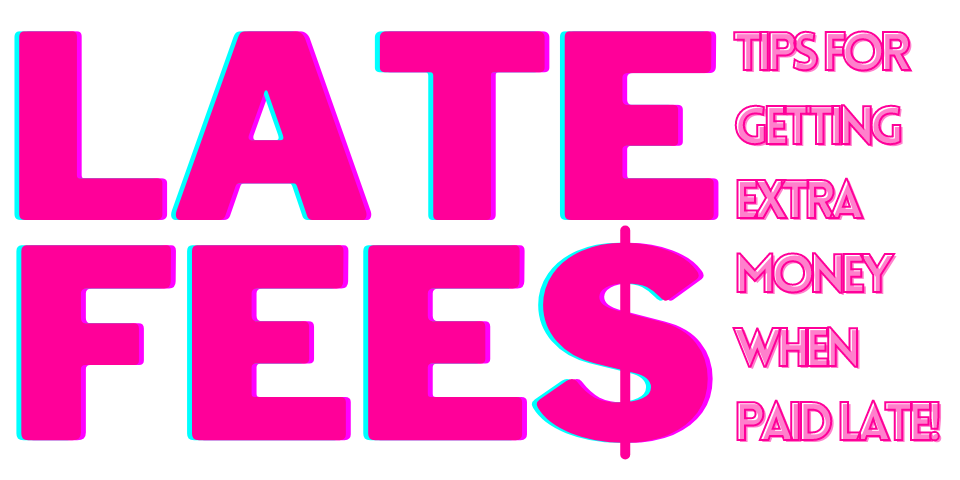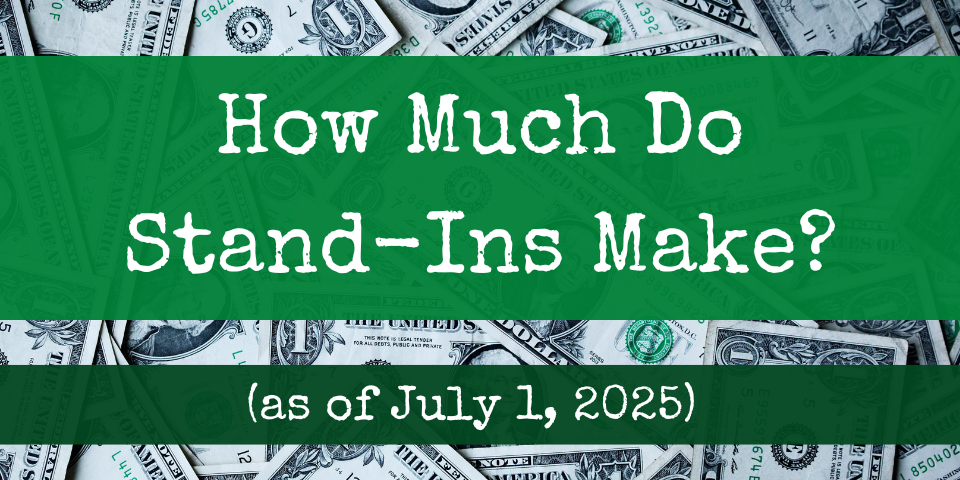If you are a union stand-in, you are probably familiar with the idea that the collective bargaining agreement (CBA) under which you work sets the minimums (or minima) for your work.
For example, as of this post, if you stand in on a SAG-AFTRA feature film, the minimum rate for a stand-in is set at $194/8 hours. You cannot stand in on a SAG-AFTRA film for less than $194/8.
You may have worked for a long time as a stand-in presuming that stand-ins only get $194/8. But that rate is only the minimum. This raises the question:
What conditions around stand-in work warrant being paid above minimum?
That’s a good question — probably with no solid answer. In this two-part post, we talk about some considerations around minimum rates for stand-ins and situations that might warrant higher rates. We also talk about how to go about getting more money for your stand-in work.
Experience
If you’ve stood in for a long time and developed valuable professional experience as a stand-in, you may start to see the issue of being paid minimum rates.
Say that you are a proven stand-in who does her job well. Productions and casting directors may not only depend on you, but they may also tell you how much they appreciate your work. And that appreciation shows, especially when productions or casting directors are faced with stand-ins who are inept, unreliable, or cause them lots of problems or extra work. You may start to realize you are making $194/8, but so are these inept stand-ins. It may start to feel wrong to be paid the same as them.
The same applies in the situation where you’ve been a regular stand-in on a production and you do your job well, and you’re regularly working with well-meaning but inexperienced stand-ins. They are making minimum rates, which may seem justified not just by the CBA but also by their level of experience. You may start to realize you are also making $194/8, but you have a lot more experience than they do. It may also start to feel wrong to be paid the same as them.
So how does your experience as a stand-in translate to your rate? It may not — if you don’t stand up for yourself and the level of experience you offer when you are up for stand-in jobs. More on that later.
So what constitutes “minimum stand-in work”? It’s not clear-cut in any CBA. However, most productions expect about the same from stand-ins.
The Job Requirements
Most of the time — at least in the New York Zone — when you stand in on a production, you will do the following work:
- watch a marking rehearsal
- stand on a mark or marks where your actor was in the marking rehearsal
- do a rehearsal with the other stand-ins (called a “second-team rehearsal”)
- on occasion, read the lines during second-team rehearsal — but not usually
On one end of the spectrum, some productions will have the stand-ins usually run lines during second-team rehearsal. On another end of the spectrum, stand-ins will be rarely used at all, with the production preferring to use the actors to line up shots.
But on average, the bullet points above are what most stand-ins do on most New York City-area stand-in jobs to date.
Reading Lines Off Camera
So when a stand-in is asked to do more than the above, it can get a little dicey to pay a stand-in a minimum rate. As a case in point, some productions will ask the stand-ins to read the lines off camera for the actors who are on camera. Is that the responsibility of the stand-in, or someone else?
On most productions, during a take, an assistant director or a script supervisor will read lines off camera when off-camera lines are needed (such as during a phone conversation on camera). Both the AD and the script supervisor are being paid much more than the stand-in. So to have the stand-in read off-camera lines and not pay that stand-in more money for that service is akin to wage theft: it is asking someone to do someone else’s work and not paying that person for that work.
Whether SAG-AFTRA would support or waive payment to stand-ins when reading lines off camera is unclear — though it seems somewhat anti-union to waive compensation for such non-standard stand-in work that borders on the work of a principal performer if not merely a crew member. Expecting stand-ins to read off-camera lines during takes is certainly not something outlined in any known CBA.
So, in light of the lack of contract language, SAG-AFTRA’s position is not any more warranted than your own personal position about reading lines off camera. This is to say while the union might say you can read lines off camera for no extra money, you do not have to read lines off camera for no extra money. You can insist that an AD or script supervisor do it, or else pay you for the service.
Assisting an Actor
Reading off-camera lines is just one example of stand-in work above minimum. Another example would be when a stand-in morphs into a kind of assistant to the actor.
On occasion, a stand-in might be asked for tasks above and beyond regular stand-in work, such as running lines with an actor or managing personal business. Such service to an actor insofar as it is expected of a stand-in is deserving of greater pay because it is not typical stand-in work but often the work of an actor’s assistant.
An actor can hire an assistant to run lines or manage schedules. If production won’t pay for you for these services to your actor above and beyond standing in for the actor, then something else needs to be worked out in terms of compensation. It may mean that the actor should pay you directly for the extra service, or you should turn down doing the additional work.
Ben’s Tip!
If you do work out compensation directly from the actor, make sure to work out with production any logistics so that your responsibilities to the actor do not conflict with your duties as a stand-in, especially if you stand in for more than one actor.
When the Actor Is Also the Director
The curious situation arises when you are booked to stand in for an actor — who is also serving as director of the television episode or even the entire production. If a production is being directed by its star actor, then the stand-in will likely be asked to do more than what is expected of a typical stand-in.
For example, in addition to doing second-team rehearsals, the stand-in for the lead actor may also have to do first-team rehearsals while the actor watches the monitors. That may mean that the stand-in needs a deeper knowledge of the scene than would expected of most stand-ins, including reading the entire script to better understand the individual scenes. That stand-in may even be asked to be off-book for rehearsals.
Such expectations of a stand-in exceed minimum expectations for a stand-in. As such, it is warranted to expect that such a stand-in should work at a higher rate than minimum. To that point, if that stand-in is not going to be paid higher than minimum, why on Earth would that stand-in accept that work if her valued experience as a stand-in could land her an easier job for the same minimum pay?
Valuing Your Stand-In Service
Given the above, if you are offered a stand-in job, hooray! And if you are an experienced stand-in who is offered a job, and if your experience is a factor in your landing that job, it may be time to negotiate.
It is also time to negotiate the moment you are presented with doing work above and beyond standing in, whether the work be running lines off camera, running lines with the actor or other kinds of assistant work, being especially leaned on by the star actor, or anything else so deserving.
So you must ask yourself this important question: What is the value of your service? In other words, how much money do you want for your experience, for running lines, or for whatever additional work desired of you?
Once you know that, you have a starting place: You can ask for that rate when you are being booked for this work or being presented with it on set. Your leverage is in saying no to the work without the additional compensation.
If the production values you or needs you to do the work, all the better — you may find yourself happy and get some additional compensation. If the production doesn’t need you, you may not land the work — but if you are experienced, it may not matter because you can book other work in its place that isn’t as demanding that pays the same. (For tips on negotiating for yourself in the moment, see this earlier post on Stand-In Central.)
You might think, then, that it’s easy to get a higher rate when you’re experienced as a stand-in. In reality, it’s probably an uphill battle, but not one that can’t be won.
Next week, we’ll cover that topic. Stay tuned!
What has been expected of you on your stand-in jobs? Have you been able to secure more money for the work? How so? Share your experiences below!






Leave A Comment